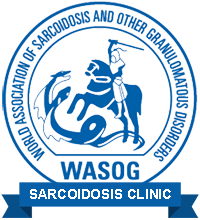Peroxisome proliferator-activated receptor g/Pro12Ala polymorphism and peroxisome proliferator-activated receptor g coactivator-1 alpha/Gly482Ser polymorphism in patients with sarcoidosis
Keywords:
sarcoidosis, peroxisome proliferator-activated receptor g, Pro12Ala polymorphism, peroxisome proliferator-activated receptor g coactivator-1 alpha, Gly482Ser polymorphism, association study, integrative “omic” approachAbstract
Background and aim of the work:. Reduced expression and activity of the peroxisome proliferator-activated receptor g (PPARG) have been measured in cells of bronchoalveolar lavage fluid in sarcoidosis patients. PPARG, together with its transcriptional coactivator peroxisome proliferator-activated receptor g coactivator- 1 alpha (PPARGC1A), has important modulating effects on immune response and apoptosis. In the present study, we investigated whether the polymorphisms Pro12Ala (rs1805192) in the PPARG gene and Gly482Ser (rs8192678) in the PPARGC1A gene, which affect transcriptional activities, are associated with sarcoidosis. Methods:We performed an integrative “omic” approach and identified the PPARG gene as a suitable candidate. Polymerase chain reaction was performed followed by restriction fragment length polymorphism to determine PPARG/Pro12Ala and PPARGC1A/Gly482Ser genotypes of 104 sarcoidosis patients and 112 healthy control subjects. Results: A higher frequency of the Ala allele (p=0.0101, OR=1.84, CI 1.18-2.88), as well as a significantly higher frequency of Pro/Ala heterozygotes and Ala/Ala homozygotes at the Pro12Ala/PPARG polymorphism (p=0.0020, OR=2.45, CI 1.42-4.25) were found in patients with sarcoidosis. In addition, a higher frequency of the Ser allele (p=0.013, OR=1.69, CI 1.13-2.53) and Gly/Ser heterozygotes and Ser/Ser homozygotes (p=0.0470, OR=1.80, CI 1.04-3.10) at the Gly482Ser/PPARGC1A polymorphism were found in patients with sarcoidosis as compared to healthy control subjects. Conclusion:Our results indicate that the presence of the Ala allele at the PPARG/Pro12Ala polymorphism and the Ser allele at the PPARGC1A/Gly482Ser polymorphism may be a predisposing factor for sarcoidosis.Downloads
Published
Issue
Section
License
This is an Open Access article distributed under the terms of the Creative Commons Attribution License (https://creativecommons.org/licenses/by-nc/4.0) which permits unrestricted use, distribution, and reproduction in any medium, provided the original work is properly cited.
Transfer of Copyright and Permission to Reproduce Parts of Published Papers.
Authors retain the copyright for their published work. No formal permission will be required to reproduce parts (tables or illustrations) of published papers, provided the source is quoted appropriately and reproduction has no commercial intent. Reproductions with commercial intent will require written permission and payment of royalties.

This work is licensed under a Creative Commons Attribution-NonCommercial 4.0 International License.




